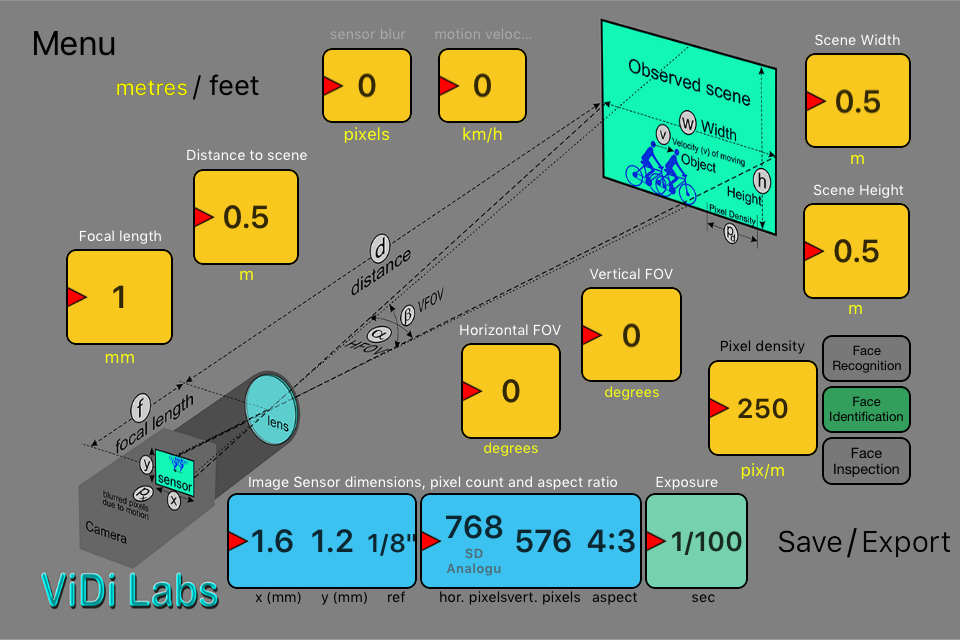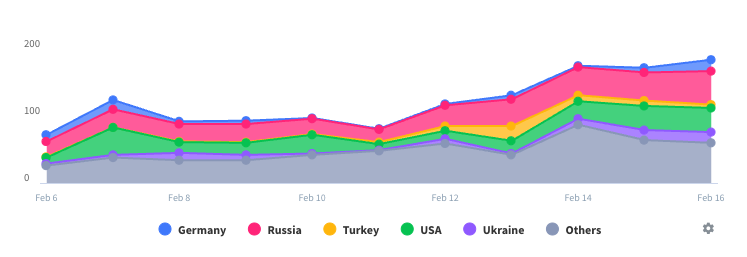
Downloads
Umsatz
Beschreibung
The ViDi Labs calculator helps you calculate the required focal length lens on a camera, or suggested distance to an object, in order to achieve the required pixel density (read clarity), compliant with various standards.
It also helps you calculate the required storage capacity for a given number of recording days or minutes (in case you need to export an incident on a USB flash drive).
It consists of two sub-applications, one called Visual and the other Digital.
Many surveillance standards or tenders would specify cameras in particular locations in a project so that facial identification or recognition is achieved at the particular area. To comply with such tenders is not easy because pixel density calculation depends on the sensor size, the focal length of the lens and the distance to the object, all interdependent.
The ViDi Labs calculator has all the right formulas to do it for you.
It contains a database of all commercially available sensors, from the smallest up to the large format cameras (currently 102MP).
All you need to know is the sensor your camera uses.
With the latest version 2.0 of this app we have introduced manual entry of any of the variables (by double-tapping a window), including distances or focal length that are not in the scrolling picker data-base, or perhaps you use an "unusual" or new sensor size.
In the Pixel Density area of the pre-set buttons on the right hand-side we introduced the correct pixel densities for Face Identification (FI), Recognition (FR) and Inspection, as per the Australian Standard corrigendum document for the IEC 62676-4: 2015.
In this version, the FI is now 350pix/m, instead of 250pix/m, and the FR is 175pix/m instead of 125pix/m. Similarly, for the Face Inspection we now have the value of 1400pix/m, instead of 1000pix/m.
These corrected numbers will help you design a better system.
You can still enter, however, any value you desire by scrolling the window or manually entering by double-tapping.
In addition to the "facial" pixel densities pre-set buttons, we have also introduced pixel densities pre-sets for common projects such as Licence Plates Recognition (LPR), money and playing cards. Please note that these values are from our own testing and experience, and they do not exist in any standard as such.
The CCTV industry is not the only field of use for the ViDiLabs calculator, because this app can be used by anybody with a digital camera, be that in photography, cinematography, or in machine vision, as it can help find the best lens, distance and camera settings for the clearest image.
In the same Visual section, the ViDi Labs calculator also calculates moving object blur as they are recorded with various exposures.
Such calculations are first in the industry and could prove extremely useful in systems used for automatic face recognition, vehicles automatic licence plate reading, reading the roulette wheels winning numbers and all other moving objects that need to be seen more clearly.
In the latest v.2.0 we introduced yet another new and unique calculations which considers the angle of the object motion relative to the optical axis.
Under the Digital sub-application, the ViDi Labs calculator also calculates the recording storage capacity for a given number of cameras, chosen length of recording, percentage of VMD and compression.
Users can also enter the type of storage required (RAID type) and the calculator will advise how many hard disks are required to achieve the chosen number of storage days.
For the first time in the surveillance industry, it can also indicate the visual quality of the chosen compression by showing a simulation of the ViDi Labs test chart for the chosen compression (H.264 or JPG).
Last, but not least, in the v.2.0 update, we have introduced calculating of the storage needed of a short event, typically lasting a few minutes, which needs to be exported to a USB flash drive for for further analysis by third party or Police for example.
Ausblenden
Mehr anzeigen...
It also helps you calculate the required storage capacity for a given number of recording days or minutes (in case you need to export an incident on a USB flash drive).
It consists of two sub-applications, one called Visual and the other Digital.
Many surveillance standards or tenders would specify cameras in particular locations in a project so that facial identification or recognition is achieved at the particular area. To comply with such tenders is not easy because pixel density calculation depends on the sensor size, the focal length of the lens and the distance to the object, all interdependent.
The ViDi Labs calculator has all the right formulas to do it for you.
It contains a database of all commercially available sensors, from the smallest up to the large format cameras (currently 102MP).
All you need to know is the sensor your camera uses.
With the latest version 2.0 of this app we have introduced manual entry of any of the variables (by double-tapping a window), including distances or focal length that are not in the scrolling picker data-base, or perhaps you use an "unusual" or new sensor size.
In the Pixel Density area of the pre-set buttons on the right hand-side we introduced the correct pixel densities for Face Identification (FI), Recognition (FR) and Inspection, as per the Australian Standard corrigendum document for the IEC 62676-4: 2015.
In this version, the FI is now 350pix/m, instead of 250pix/m, and the FR is 175pix/m instead of 125pix/m. Similarly, for the Face Inspection we now have the value of 1400pix/m, instead of 1000pix/m.
These corrected numbers will help you design a better system.
You can still enter, however, any value you desire by scrolling the window or manually entering by double-tapping.
In addition to the "facial" pixel densities pre-set buttons, we have also introduced pixel densities pre-sets for common projects such as Licence Plates Recognition (LPR), money and playing cards. Please note that these values are from our own testing and experience, and they do not exist in any standard as such.
The CCTV industry is not the only field of use for the ViDiLabs calculator, because this app can be used by anybody with a digital camera, be that in photography, cinematography, or in machine vision, as it can help find the best lens, distance and camera settings for the clearest image.
In the same Visual section, the ViDi Labs calculator also calculates moving object blur as they are recorded with various exposures.
Such calculations are first in the industry and could prove extremely useful in systems used for automatic face recognition, vehicles automatic licence plate reading, reading the roulette wheels winning numbers and all other moving objects that need to be seen more clearly.
In the latest v.2.0 we introduced yet another new and unique calculations which considers the angle of the object motion relative to the optical axis.
Under the Digital sub-application, the ViDi Labs calculator also calculates the recording storage capacity for a given number of cameras, chosen length of recording, percentage of VMD and compression.
Users can also enter the type of storage required (RAID type) and the calculator will advise how many hard disks are required to achieve the chosen number of storage days.
For the first time in the surveillance industry, it can also indicate the visual quality of the chosen compression by showing a simulation of the ViDi Labs test chart for the chosen compression (H.264 or JPG).
Last, but not least, in the v.2.0 update, we have introduced calculating of the storage needed of a short event, typically lasting a few minutes, which needs to be exported to a USB flash drive for for further analysis by third party or Police for example.
Screenshots
ViDiLabs Calc Häufige Fragen
-
Ist ViDiLabs Calc kostenlos?
Ja, ViDiLabs Calc ist komplett kostenlos und enthält keine In-App-Käufe oder Abonnements.
-
Ist ViDiLabs Calc seriös?
Nicht genügend Bewertungen, um eine zuverlässige Einschätzung vorzunehmen. Die App benötigt mehr Nutzerfeedback.
Danke für die Stimme -
Wie viel kostet ViDiLabs Calc?
ViDiLabs Calc ist kostenlos.
-
Wie hoch ist der Umsatz von ViDiLabs Calc?
Um geschätzte Einnahmen der ViDiLabs Calc-App und weitere AppStore-Einblicke zu erhalten, können Sie sich bei der AppTail Mobile Analytics Platform anmelden.

Benutzerbewertung
Die App ist in Saudi-Arabien noch nicht bewertet.

Bewertungsverlauf
ViDiLabs Calc Bewertungen
Keine Bewertungen in Saudi-Arabien
Die App hat noch keine Bewertungen in Saudi-Arabien.
Store-Rankings

Ranking-Verlauf
App-Ranking-Verlauf noch nicht verfügbar

Kategorien-Rankings
App ist noch nicht gerankt
ViDiLabs Calc Installationen
Letzte 30 TageViDiLabs Calc Umsatz
Letzte 30 TageViDiLabs Calc Einnahmen und Downloads
Gewinnen Sie wertvolle Einblicke in die Leistung von ViDiLabs Calc mit unserer Analytik.
Melden Sie sich jetzt an, um Zugriff auf Downloads, Einnahmen und mehr zu erhalten.
Melden Sie sich jetzt an, um Zugriff auf Downloads, Einnahmen und mehr zu erhalten.
App-Informationen
- Kategorie
- Utilities
- Herausgeber
- ViDi Labs Pty
- Sprachen
- English
- Letzte Veröffentlichung
- 2.0.2 (vor 2 Jahren )
- Veröffentlicht am
- Jun 10, 2016 (vor 8 Jahren )
- Zuletzt aktualisiert
- vor 2 Wochen
- © 2024 AppTail.
- Unterstützung
- Privacy
- Terms
- All Apps


